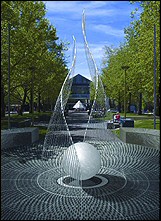The Brilliant Redemption
contributed by Michael Hall
Jack Brilliant probably arrived in Canberra in 1911 when his father, James Brilliant, was appointed as clerk of works. Jack was born in Brunswick, Victoria in 1897, worked as a mechanic, played football for the Power House and Queanbeyan Warrigals and was a handy sprinter in races at local sports carnivals. He was only 19 when he enlisted on 19 May 1916 in Sydney. He deserted the camp at Liverpool in October 1916. It was due, at least in part, to Walter Burley Griffin. Almost from the time he arrived in Australia, Griffin was in conflict with senior public servants whom he believed wanted to replace his plan for Canberra with their own. He enjoyed the political support of King O’Malley who became Minister for Home Affairs for the second time in late 1915. In May 1916 O’Malley announced that his close confidante, James Brilliant, would oversee all work in the Territory as Griffin’s executive officer. In effect, Brilliant’s former supervisors became answerable to him. O’Malley then contrived to have Parliament appoint a Royal Commission to investigate the administration of the Federal Territory and hearings were held in Canberra, Sydney and Melbourne during the second half of 1916. It was against this background that Jack Brilliant deserted. But he would redeem himself. A warrant for his arrest for desertion was issued on 9 October 1916 and yet four days later Brilliant turned up in Hobart where he enlisted again. He embarked for overseas in June 1917 and joined the 40th Battalion in France at the end of January 1918. Brilliant was awarded the Military Medal for his actions on 18 April 1918 at Ville-sur-Ancre (near Albert) where he rushed a German patrol, bayoneting one of the enemy and taking a prisoner. By July he had been promoted to Sergeant and, despite a bayonet wound to the knee, the following month he was with his unit battling the Germans along the north bank of the Somme River towards the Hindenburg Line near Bellicourt. After the war Brilliant moved to the Illawarra where he died in 1973. His father resigned from his job in Canberra in 1917. |  |

